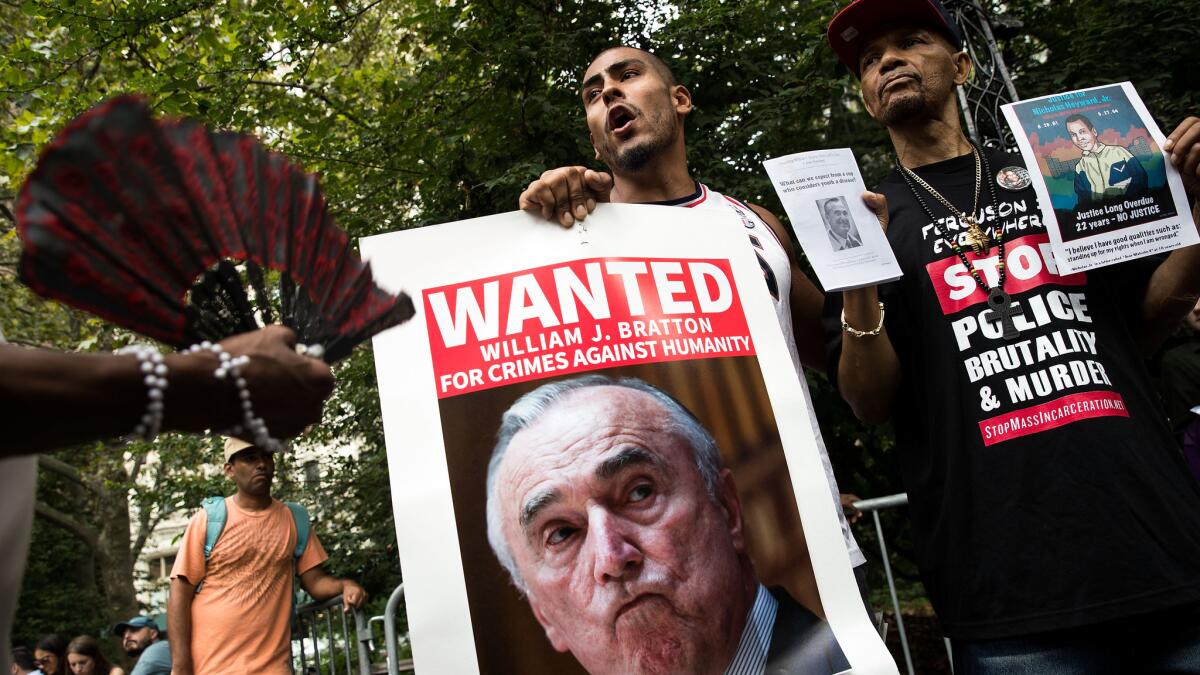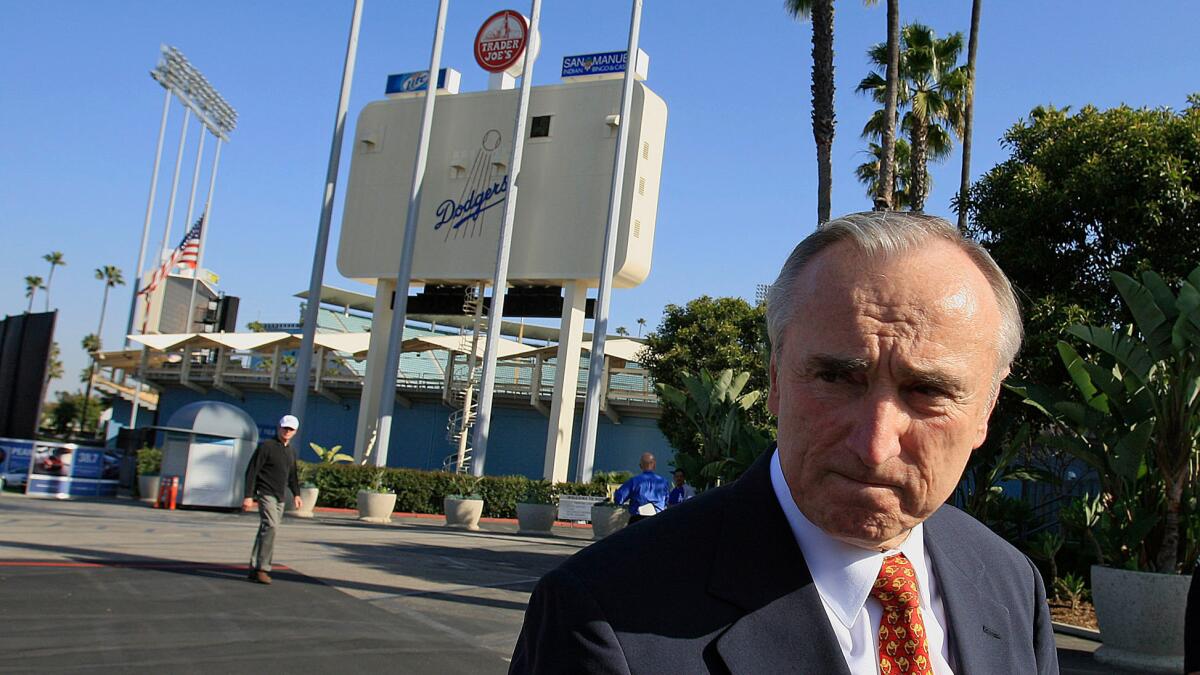William Bratton, stepping down as New York police commissioner, says, ‘I wish I had more time’

William Bratton, New York City’s Police Commissioner, announced his resignation on Tuesday. Bratton will end his 45-years in policing to take a job in the private sector.
- Share via
Reporting from New York — When William J. Bratton announced he was stepping down as L.A.’s police chief, even the ACLU seemed saddened.
Now, seven years later and three time zones away, Bratton’s resignation as New York City’s police commissioner is drawing a similar reaction from the U.S. attorney leading a corruption investigation that has already resulted in criminal charges against four ranking New York police officials.
“Over a long career, on both coasts, no one has done more for policing and public safety in America’s largest cities than Bill Bratton,” federal prosecutor Preet Bharara said.
Bratton, one of the nation’s most prominent and well-known cops, has long had a knack for turning potential adversaries into admirers.
Over a long career, on both coasts, no one has done more for policing and public safety in America’s largest cities than Bill Bratton.
— U.S. Atty. Preet Bharara
His resignation, effective next month, ends a long career in law enforcement that included stints as the top police official in some of America’s largest cities. It also marks the second time he has stepped down from police work to take a private sector job.
“I’m leaving with reluctance,” Bratton, 68, said at a news conference with Mayor Bill de Blasio. “I wish I had more time chronologically to stay around three, four years to work on the issues that are going to take that long to straighten out, but I don’t have that kind of time.”
Bratton served as New York police commissioner in the 1990s under Mayor Rudolph Giuliani, when he was credited with moving aggressively to bring down the city’s high crime rate. He returned to the office in January 2014, after serving in Los Angeles from 2002 to 2009.
During Bratton’s second tenure, the department has been dogged by the ongoing federal corruption investigation and a strained relationship with black residents.

One of the central events of that discord stemmed from the death of Eric Garner, who died in July 2014 after a police officer put him an apparent chokehold during an arrest for selling loose cigarettes. The case became a rallying point for the Black Lives Matter movement and drew national attention.
Later that year, two New York police officers were fatally shot while sitting in their patrol car by a gunman who had said on social media that he was seeking retaliation for Garner’s death.
Bratton said Tuesday that the department had made progress in healing relations by instituting neighborhood policing policies and adding more training for officers.
“Regarding the issue of race and community relations, we’re on a journey, but it’s not a journey that’s unique to New York City,” he said.
“It’s a crisis in America at this moment; the national election is revolving around it. I would argue that we are farther along in New York City than most places to meet it.”
But the racial tensions remain. Bratton’s announcement came a day after Millions March NYC, a group linked to the Black Lives Matter movement, began a protest in a park near City Hall, demanding — among other things -- the commissioner’s resignation.
Bratton, however, said he was stepping down for personal reasons only.
“I received an offer that for me and my wife was extraordinarily exciting,” he said. Bratton declined to say anything more about his new job except that it was at a private firm not involved in policing, and that he would be remaining in New York.
In Los Angeles, his tenure was defined by data-driven policing, a significant drop in crime and ongoing efforts to mend the rifts in the community that he inherited.
The LAPD he took over was still crawling out from under its reputation as a military-style operation that confronted urban problems with aggression and force. It was also still steadying itself following the Rampart scandal, in which members of an anti-gang unit were blamed for narcotics dealings, unprovoked shootings and planting false evidence.
At the time, the department was operating under a consent decree – a binding agreement with the U.S. Department of Justice that spelled out dozens of major reforms the LAPD had to implement.
Initially, Bratton seemed to embrace the decree as a blueprint for remaking the LAPD. But as the years passed, he and others chafed at the court’s refusal to loosen its grip on the department. The oversight came to an end in 2013, years after Bratton had left.
After he left the LAPD, Bratton became chairman of a New York-based security consulting firm, Kroll. But he was drawn back West.
In 2011, he was asked to head a University of California investigation into the pepper spraying of student protesters at UC Davis.
The university system had reached out to him in part because of his forceful handling of the 2007 May Day confrontation at MacArthur Park, where L.A. police officers were caught on video wielding batons and firing rubber bullet to disperse a crowd of largely peaceful protesters. The city eventually paid a $13-million settlement to protesters and bystanders.
Bratton also was hired to develop a “security blueprint” for Dodger Stadium after the 2011 near-fatal beating of Giants fans Bryan Stow.

Bratton said that under his leadership in New York, the department had brought down crime, become better prepared for a potential terrorist attack and had improved the safety of officers through the purchase of better equipment. Bratton will be replaced as commissioner by James O’Neill, the chief of department and top uniformed officer.
“I wish I had words for what this man has accomplished,” De Blasio said.
Haller is a special correspondent.
ALSO
How Khizr and Ghazala Khan went from grieving parents to stars of the presidential race
For Baltimore officers cleared in Freddie Gray’s death, an uncertain future
‘Black lives matter!’ chants erupt as Mothers of the Movement take the stage at the DNC
UPDATES:
12:20 p.m.: This article was updated with additional background information and comments from Mayor Bill de Blasio and U.S. Atty. Preet Bharara.
This article was originally published at 11:40 a.m.
More to Read
Sign up for Essential California
The most important California stories and recommendations in your inbox every morning.
You may occasionally receive promotional content from the Los Angeles Times.










